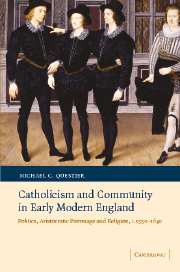 Catholicism and Community in Early Modern England
Catholicism and Community in Early Modern England Book contents
- Frontmatter
- Contents
- List of illustrations
- Preface
- Note on the text
- List of abbreviations
- 1 Introduction
- 2 The local setting
- 3 The emergence of a Catholic dynasty: the Brownes of Cowdray
- 4 The Brownes, Catholicism and politics until the Ridolfi plot
- 5 The Brownes, Catholicism and politics from the 1570s until the early 1590s
- 6 The entourage of the first Viscount Montague
- 7 A period of transition
- 8 The 1590s to the Gunpowder plot
- 9 Catholic politics and clerical culture after the accession of James Stuart
- 10 The household and circle of the second Viscount Montague
- 11 ‘Grand captain’ or ‘little lord’: the second Viscount Montague as Catholic leader
- 12 The later Jacobean and early Caroline period
- 13 The second Viscount Montague, his entourage and the approbation controversy
- 14 Catholicism, clientage networks and the debates of the 1630s
- 15 Epilogue: the civil war and after
- Appendix 1 The Brownes in town and country
- Appendix 2 The families of Browne, Dormer, Gage and Arundell
- Index
- Titles in the series
12 - The later Jacobean and early Caroline period
Published online by Cambridge University Press: 06 July 2010
- Frontmatter
- Contents
- List of illustrations
- Preface
- Note on the text
- List of abbreviations
- 1 Introduction
- 2 The local setting
- 3 The emergence of a Catholic dynasty: the Brownes of Cowdray
- 4 The Brownes, Catholicism and politics until the Ridolfi plot
- 5 The Brownes, Catholicism and politics from the 1570s until the early 1590s
- 6 The entourage of the first Viscount Montague
- 7 A period of transition
- 8 The 1590s to the Gunpowder plot
- 9 Catholic politics and clerical culture after the accession of James Stuart
- 10 The household and circle of the second Viscount Montague
- 11 ‘Grand captain’ or ‘little lord’: the second Viscount Montague as Catholic leader
- 12 The later Jacobean and early Caroline period
- 13 The second Viscount Montague, his entourage and the approbation controversy
- 14 Catholicism, clientage networks and the debates of the 1630s
- 15 Epilogue: the civil war and after
- Appendix 1 The Brownes in town and country
- Appendix 2 The families of Browne, Dormer, Gage and Arundell
- Index
- Titles in the series
Summary
It is almost axiomatic among historians that the later years of James's reign were a time of relative peace and quiet for Catholics. In fact, the extant narratives of the later Jacobean period do not mention English Catholics much, even while James's projects for a Catholic marriage for Prince Charles were causing all sorts of political difficulties for the crown. These difficulties became exponentially worse after James's son-in-law, the elector palatine, had been deprived of his recently acquired crown in Bohemia and had been ejected from his own principality, the Palatinate of the Rhine. However, the process which led finally to Prince Charles being married to a foreign Catholic bride was one in which most contemporaries assumed that English Catholics had a vested interest and one which they would manipulate for their own advantage, and use in order to make common cause with foreigners for their mutual benefit.
The second Viscount Montague was not himself, it seems, at the forefront of Catholic attempts to muscle in on the political process during the late 1610s and early 1620s. He never attempted to repeat his interventionist tactics in the parliament of 1604, or his challenge to the regime in 1611 over the issue of allegiance. But he was not entirely absent from the stage. And it is certainly possible to detect members of his family circle and entourage who heavily engaged themselves in the political arena.
- Type
- Chapter
- Information
- Catholicism and Community in Early Modern EnglandPolitics, Aristocratic Patronage and Religion, c.1550–1640, pp. 387 - 432Publisher: Cambridge University PressPrint publication year: 2006


